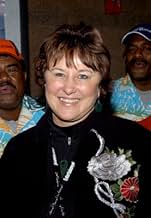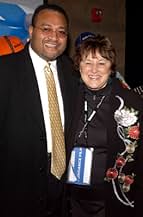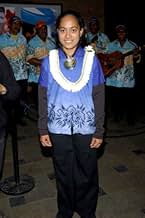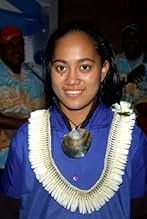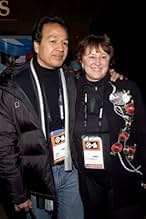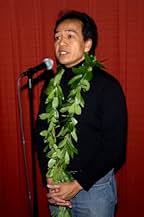Ajouter une intrigue dans votre langueA coming of age story about a young woman, Viki, attempting to escape the stifling conformity of island culture. Inspired by the myth of the Warrior Woman, Viki recovers from the death of he... Tout lireA coming of age story about a young woman, Viki, attempting to escape the stifling conformity of island culture. Inspired by the myth of the Warrior Woman, Viki recovers from the death of her father and fights for justice and freedom.A coming of age story about a young woman, Viki, attempting to escape the stifling conformity of island culture. Inspired by the myth of the Warrior Woman, Viki recovers from the death of her father and fights for justice and freedom.
- Réalisation
- Scénario
- Casting principal
- Récompenses
- 1 victoire et 1 nomination au total
James Davenport
- Judge Clarke
- (as James M Davenport)
Avis à la une
As a Polynesian of Hawai'i, I am of course very supportive of Polynesian actors, actresses, and directors gaining exposure and fame in the international arena of theater and movies.
It is way overdue for the people of our region to be recognized for our deeper sense of beauty, which lies more in the depth of our eyes than the swaying of our hips.
As this film portrays, we have traditional cultural values and customs in our heritage which lie at the core of our beauty, which has managed to survive in some of us, and yet not others.
After nearly two centuries of colonization and absorption by foreign cultures, it is amazing that the spirit in our eyes and in the land still shines!
To produce this film was no small task due to logistics and funding, but it also was very brave to take the risk of being possibly scorned by the director's ancestral villagers.
In real life as well as seen in this film, the bitterness in the eyes of those who scorn "the old ways" of religion; are also likely to scorn "the new ways" of taking risks and initiatives.
I salute this film for bringing our focus to this unspoken struggle and the beauty of the main character who symbolizes a crucial cultural and spiritual link to the past and to the future, except I want MORE. I want more of the director's talent; and more of the main character's spiritual strength; and more exposure to the depth of our culture.
Are there investors interested in films that show natives thriving beyond surviving?
Imagine if she would go on to a university in New Zealand and become a professor of environmental law, who teaches the values of traditional knowledge and provides the means for livelihoods on Rotuma based on traditional cultural practices of caring for the land?
What if she were to also develop artistic talents and sculpt a large statue of "Warrior Mother" and place it in the middle of the village (by the Christian church ) and dedicate it with proper traditional spiritual ceremonies and have all the villagers join in chanting without fear of hell and damnation...now wouldn't that move us all onto another level of greatness?
We all deserve MORE.
Encore! Encore! Hana Hou! We want MORE.
It is way overdue for the people of our region to be recognized for our deeper sense of beauty, which lies more in the depth of our eyes than the swaying of our hips.
As this film portrays, we have traditional cultural values and customs in our heritage which lie at the core of our beauty, which has managed to survive in some of us, and yet not others.
After nearly two centuries of colonization and absorption by foreign cultures, it is amazing that the spirit in our eyes and in the land still shines!
To produce this film was no small task due to logistics and funding, but it also was very brave to take the risk of being possibly scorned by the director's ancestral villagers.
In real life as well as seen in this film, the bitterness in the eyes of those who scorn "the old ways" of religion; are also likely to scorn "the new ways" of taking risks and initiatives.
I salute this film for bringing our focus to this unspoken struggle and the beauty of the main character who symbolizes a crucial cultural and spiritual link to the past and to the future, except I want MORE. I want more of the director's talent; and more of the main character's spiritual strength; and more exposure to the depth of our culture.
Are there investors interested in films that show natives thriving beyond surviving?
Imagine if she would go on to a university in New Zealand and become a professor of environmental law, who teaches the values of traditional knowledge and provides the means for livelihoods on Rotuma based on traditional cultural practices of caring for the land?
What if she were to also develop artistic talents and sculpt a large statue of "Warrior Mother" and place it in the middle of the village (by the Christian church ) and dedicate it with proper traditional spiritual ceremonies and have all the villagers join in chanting without fear of hell and damnation...now wouldn't that move us all onto another level of greatness?
We all deserve MORE.
Encore! Encore! Hana Hou! We want MORE.
THE LAND HAS EYES will be offered in May 2006 (a few stations might jump the gun and run it in late April) as soft-fed item on PBS...it doesn't have a set place in the prime-time schedule, and thus even more than other PBS programming, stations have their own choice as to when to run it...so look for it particularly in the Saturday primetime hours, where American Public Television's syndicated film packages often run on stations, or call your station, of course, both to ask when they'll run it and to encourage them to consider it, if you wish. I suspect this maneuver might unnecessary at KHET Honolulu or KGTF Agana (Guam), but as we move away from the Pacific, there might or might not be a greater tendency to not worry too much about running such a film...as good as it might be (I haven't seen it).
I saw this film at the Rotterdam Festival, as did presumably all the other voters. The Director was present and seemed to have worked very hard and be very committed to the project, which I think explains the above average reception and mark it got. It's most similar to a feature length episode of Aussie kids favourite "Round the Twist" but it takes itself too seriously to have even that redeeming feature. The movie in itself is maybe worth seeing if you're trying to do a cinematic world tour visiting all UN member states, as I can't think of another Fijian movie but overall it was generic, poorly acted (albeit by an amateur cast) and prey to the subaltern mentality. The moral of the story seemed to be that native islanders will try and screw each other over, but as long as there is an essentially decent white governor to step in, all problems can be solved (by leaving the island).
Saw the film at the first theatrical release in Honolulu. I was surprised at how many people were in the audience given the type of film (inde film with subtitles). The film quality at times wasn't great (grainey and exalted). There was a Q&A after the film and there were several other Polynesians in the audience that really identified with the film, growing up on a small island and looking forward to bigger adventures in life.
There was one scene involving pigs that an audience member asked about and the thoughts of the director and how it came across weren't really in sync. His description of what he was trying to say via the visuals wasn't presented in such a way that I received that same message. The film does show some very beautiful views and vistas of the island and the people. It also gives some insight into the day to day life of people who live on a small island.
I enjoyed the film overall to get a look into other areas of the world and to see the cultures of those people. In the case of this movie, I think that mission was accomplished successfully.
There was one scene involving pigs that an audience member asked about and the thoughts of the director and how it came across weren't really in sync. His description of what he was trying to say via the visuals wasn't presented in such a way that I received that same message. The film does show some very beautiful views and vistas of the island and the people. It also gives some insight into the day to day life of people who live on a small island.
I enjoyed the film overall to get a look into other areas of the world and to see the cultures of those people. In the case of this movie, I think that mission was accomplished successfully.
A fairly solid movie.
I got the required amount out of 'The Land Has Eyes'. Sapeta Taito leads a decent cast nicely, portraying a story that holds suitable intrigue and drama - it gets hearty at one particularly moment too. Of course it isn't a perfect movie, the pacing for one could've been slightly improved, but for what it is I had a pleasant enough time with it.
Cool seeing the visuals of Rotuma, a dependency of Fiji, on the silver screen. Hopefully there'll be more in the future.
////// A 2004 Rotuman film written and directed by Vilsoni Hereniko. "first ever feature film from Rotuma".
I got the required amount out of 'The Land Has Eyes'. Sapeta Taito leads a decent cast nicely, portraying a story that holds suitable intrigue and drama - it gets hearty at one particularly moment too. Of course it isn't a perfect movie, the pacing for one could've been slightly improved, but for what it is I had a pleasant enough time with it.
Cool seeing the visuals of Rotuma, a dependency of Fiji, on the silver screen. Hopefully there'll be more in the future.
////// A 2004 Rotuman film written and directed by Vilsoni Hereniko. "first ever feature film from Rotuma".
Le saviez-vous
- AnecdotesFiji's official submission to the 2006 Academy Awards.
Meilleurs choix
Connectez-vous pour évaluer et suivre la liste de favoris afin de recevoir des recommandations personnalisées
Détails
- Date de sortie
- Pays d’origine
- Sites officiels
- Langues
- Aussi connu sous le nom de
- The Land Has Eyes
- Lieux de tournage
- Rotuma, Fidji(location: Rotuma Island)
- Société de production
- Voir plus de crédits d'entreprise sur IMDbPro
- Durée1 heure 27 minutes
- Couleur
Contribuer à cette page
Suggérer une modification ou ajouter du contenu manquant


